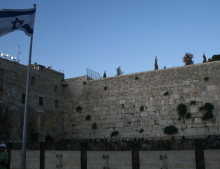The Western Wall is central to Judaism today as the holiest site for regular religious observance, but when Israel announced plans to build a cable car there and add elevators and tunnels to link it to the Jewish Quarter in the Old City, the Palestinian response was outrage.
The Palestinian Foreign Ministry issued a statement that “condemned” the plans and—according to a report by the WAFA Palestinian news agency—didn’t even refer to it as the Western Wall, but as the Al-Buraq wall, the Islamic name for the location that discounts any Jewish connection to the site. And last but not least, the Palestinians called upon the powerful United Nations Security Council to stop Israel from carrying out a collection plans for Jerusalem, including the cable car.
The most important holy site in Judaism is the Temple Mount, but with Jewish religious observance there restricted to prevent conflict with the Arabs, the site with the most practical religious use for Judaism today is the Western Wall. Despite that, the Palestinians have long been assertive regarding activities buy klonopin paypal done around the Wall and claim the territory as part of their capital in Jerusalem.
The Israeli cable car, according to a press release from their Tourism Ministry, will travel from The First Station—a cultural and shopping center in Jerusalem—via the Mount of Olives to the Dung Gate in the Old City, which is near the largest entrance to the Western Wall.
The Tourism Ministry press release said the car, which was approved on Sunday and would start operating in 2021, would “offer a solution to problems related to the inaccessibility of the Western Wall,” which is generally via narrow, winding and crowded routes today.
Said the press release, “The cable car will provide easy, quick and convenient access to the approximately 130,000 tourists and visitors who converge on the site every week.”
That, apparently, is one of the Israeli actions in Jerusalem that could work to prevent peace with the Palestinians, according to the Foreign Ministry statement. And when helping tourists access holy sites is a roadblock to peace, one has to wonder what version of “peace” is being discussed.
(By Joshua Spurlock, www.themideastupdate.com, May 29, 2017)

